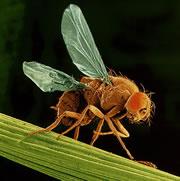 Male flies entice the girls by tapping and tilting various body parts.© SPL
Male flies entice the girls by tapping and tilting various body parts.© SPLMale and female fruitflies have been engineered to switch courtship roles, through the manipulation of a single gene.
The study, which appears in Cell1, shows how a simple genetic adjustment can cause a dramatic change in sexual behaviour. "It was quite something to see," says Barry Dickson, who is one of the authors and is based at the Austrian Academy of Sciences in Vienna.
The mating behaviours of the Drosophila fruitfly are a far cry from intricate Hollywood romance. The male performs a series of tapping and tilting movements, to which the female usually responds if she has not recently mated. Females, in contrast, never court at all.
But Dickson and his colleague Ebru Demir reversed this behaviour by designing female flies with the male version of a gene called fruitless. These insects initiated courtship with other females as often as their male counterparts did. The tweaked female flies could only be encouraged to court males if the males were designed to emit female pheromones, a form of natural chemical attractant.
When male flies were given the female version of the fruitless gene, they stopped courting and became passive about sex.
Scent of a woman
Scientists are still struggling with the question of how this gene affects sexual behaviour so strongly. They say it does not influence fly morphology: the insects do not look any different. Instead, it seems the gene influences the insect's nervous system.
Dickson and Demir's results add to a number of studies that have shown the influence of genes on sexual behaviour, in both animals and humans. Homosexuality has been documented in more than 400 species, including many mammals, and research has linked this behaviour to everything from social factors to maternally inherited genes.
"It's pretty clear that the survival of a species depends heavily on its ability to reproduce. So that's something that you'd want programmed into the genes," Dickson says.
ADVERTISEMENT
But the researchers caution that controls on a fruitfly's sexual behaviour are undoubtedly different from our own. "In the case of humans, we know that our sexual behaviours are not irreversibly set by our genes," says Dickson. "But that doesn't mean the genes have no influence," he adds.
"There's still a lot of mystery surrounding the causes of homosexuality," says Hans Van Gossum of the University of Antwerp, Belgium, who has studied fly mating patterns. "It's too early to draw strong conclusions on simple mechanisms like this."
Austrian Academy of Sciences in Vienna
-
References
- Demir E., Dickson B. J., et al. Cell, 121. 785 - 794 (2005). | Article |
